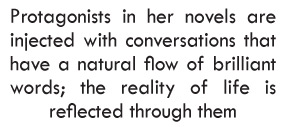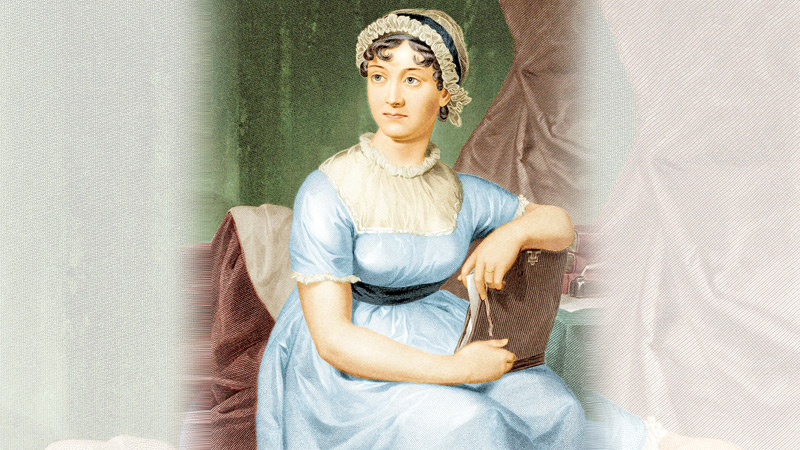Cobwebs had hardly infiltrated into my decade old bookshelf. It has cherished and relished the masterpieces of trailblazing, swashbuckling and charismatic novelists who posthumously dwell in the hearts of their enduring readers, scattered across the world.
 While having a skim read on some of the randomly selected books, my eyes end up with the pages of Pride and Prejudice; the writer of the same does not need an introduction. Jane Austen, despite leaving the world at the relatively young age of 42 is my protagonist in this small write-up. The beauty and credibility of Jane Austen’s words are ineffable.
While having a skim read on some of the randomly selected books, my eyes end up with the pages of Pride and Prejudice; the writer of the same does not need an introduction. Jane Austen, despite leaving the world at the relatively young age of 42 is my protagonist in this small write-up. The beauty and credibility of Jane Austen’s words are ineffable.
I neither leave a baloney nor do I leave a hyperbole in saying that the English writer Jane Austen is undisputedly one of the most preeminent, prominent and illustrious authors in the domain of English Literature.
Having been translated into many languages, books of Austen enjoy the rare privilege of being adapted to countless number of movies and television series that have gone viral through the continents and the hemispheres.
Two centuries ago
Unlike some naively and childishly written laughable love stories, that are being heavily advertised on social media platforms that have no knack of being rooted in the heart of the reader, Austen and all the stories, penned by her more than two centuries ago are still as pertinent, consistent and phenomenal today as they were in the Regency era.
The Regency period lasted for nine years from 1811-1820 during which the rise of many distinguished writers, including Jane Austen and Regency Classicism was supposed to be one of the most noticeable elements that took place at the time. Austen’s glamour and claim rise above the time and cultural parameters when she persistently gives out a significant and unshakable vision and voice for the time that has not yet arrived.
Among her six completed novels, Pride and Prejudice, published in 1813 is said to be her most famous novel which is even today being cited in university assignments from the bachelor’s to the PhDs.
Widely known being a novel of manners or else a novel which revives and regenerates a social world, Pride and Prejudice is regarded as an outstanding masterpiece that has ever been popular in the world of English Literature. Writings of the pivotal author in Austen are a decisive force in its brainy, savvy and witty use of farcical, sober and prudent portrayals of characters as well as that of the respective liaison and link, embedded with the situations, encountered within the flow of the story.
Trailblazing and pioneering novel writing strategies were Austen’s forte, in this light, the free indirect style is her synonym.
I looked up to the Oxford dictionary for the definition of “Free Indirect Style”, and it goes as follows; “A way of narrating characters’ thoughts or utterances that combines some of the features of third-person report with some features of first-person direct speech allowing a flexible and sometimes ironic overlapping of internal and external perspectives”.
While this specific style of writing is consistently used in Austen’s books, authors such as James Joyce and Virginia Woolf deserve credit to have extended the use of the same within their literary work in the 19th century. Woolf in her novels ‘To the Lighthouse’ and ‘Mrs Dalloway’ often settles with the free indirect discourse.
Social commentator
Irish author James Joyce’s “The Dead” (in Dubliners), A Portrait of the Artist as a Young Man, and Ulysses also did not fail to use the free indirect speech. Albeit frequently categorised by some readers as a romance writer, Austen is proudly celebrated as a social commentator of her time too during which her contributions to the social upheavals notably with regard to the rights of the women were of paramount significance.
She was critical of the fact that the women of her time were denied many of the freedoms and opportunities that they deserved as much as their male counterparts enjoyed with.
Austen’s wit in satire is universal. Protagonists in her novels are injected with conversations that have a natural flow of brilliant words; the reality of life is reflected through them. Hers is an unassuming style of creating talking shops through her characters, her characters come to life, as they speak-such a uniqueness seen only among very few novelists.
Her work is a timeless insight and that resonates with the readers of all ages. One of the hallmarks of Austen’s writing is the fact that she was able to have a lasting and significant impact on modern literature. Her pen was her weapon in creating complex characters with universal identity; generations of writing communities are influenced by the sharpness of her pen.
A pivotal source of inspiration in the field of fiction writing, the legacy that Austen left behind is impeccable and would continue to inspire the writing community at large.









